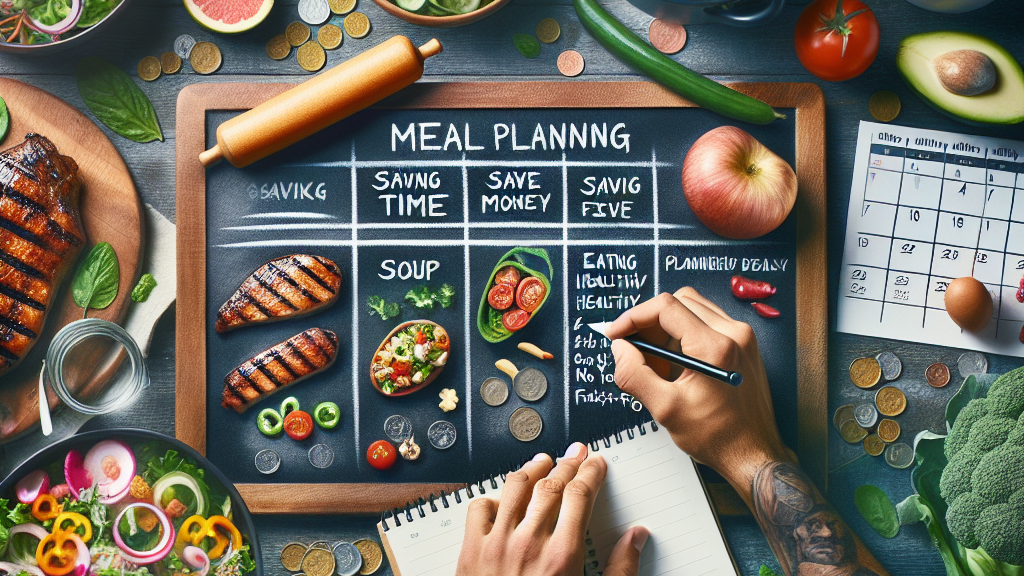Feeling overwhelmed by the “what’s for dinner?” question every night? Ditch the last-minute scramble and embrace the power of meal planning! It might sound daunting at first, but with these simple steps, you’ll be a meal planning pro in no time. This guide empowers beginners to navigate the process, optimize grocery shopping, and unlock a world of delicious and healthy meals. Meal Planning for Beginners.
Embracing the Benefits of Meal Planning

Meal planning isn’t just about having a list of dinners; it’s a holistic approach to managing your food for the week. Here’s how it benefits you:
- Saves Time: No more frantic meal decisions after a long day. Having a plan eliminates grocery store impulse buys and streamlines your cooking process.
- Reduces Food Waste: Sticking to a plan means buying only what you need, leading to less food spoilage and saving you money in the long run.
- Promotes Healthy Eating: Meal planning allows you to focus on balanced and nutritious meals. You can plan around dietary preferences and ensure everyone in the family has healthy options.
- Reduces Stress: Knowing what you’re going to eat takes away the stress of last-minute decisions. This frees up mental space and allows you to focus on other aspects of your life.
Creating a Personalized Meal Plan:

Here’s where the magic begins!
- Assess Your Needs: Consider your dietary restrictions, allergies, and preferences. Think about your schedule – how many nights do you have time for elaborate meals, and which nights require quicker options?
- Set Realistic Goals: Start with a plan that fits your current lifestyle. Aim for 3-5 planned meals per week and leave room for flexibility.
- Inventory Check: Take stock of what’s already in your pantry and refrigerator. Incorporate these items into your plan to avoid waste.
- Embrace Inspiration: Browse cookbooks, online recipes, or blogs for inspiration. Focus on meals that look appealing and can be easily incorporated into your schedule.
- Plan Your Meals: Allocate meals throughout the week, considering leftovers and quick options for busy nights. Balance meals to include protein, carbohydrates, and healthy fats.
- Don’t Forget Breakfast & Lunch: Planning isn’t just for dinner! Include breakfast and lunch ideas to ensure a balanced and nutritious diet throughout the day.
Conquering the Grocery Store with Your Meal Plan:

- List It Out: Create a detailed grocery list based on your meal plan.
- Shop Smart: Utilize store flyers and coupons. Look for sales and deals on the ingredients you need for your planned meals.
- Think Long-term: Purchase staples like rice, pasta, or beans that can be used in multiple meals throughout the week.
- Prioritize Fresh Produce: Choose fresh fruits and vegetables based on your planned recipes. Remember, these have a shorter shelf life, so buy accordingly.
Recipe Inspiration to Spark Your Creativity:
- Quick and Easy Dinners: Stir-fries, one-pan meals, sheet pan dinners, or pasta dishes are great options for busy nights.
- Meal Prep Power: Dedicate some time on weekends to cook larger batches of certain meals. Portion them out for lunches or quick dinners throughout the week.
- Leftovers Reimagined: Get creative with leftovers! Turn leftover roasted chicken into a salad or stir-fry. Use leftover soup as a base for a new creation.
- Don’t Be Afraid to Experiment: Try new recipes each week to keep things exciting. There are endless healthy and delicious possibilities out there!
Additional Tips:
- Involve Your Family: Let everyone pick out a meal they’d like to try, or have them help with grocery shopping or food prep.
- Be Flexible: Life happens! Don’t be afraid to adjust your meal plan if something unexpected comes up.
- Embrace Leftovers: Leftovers are your friend! They can be used for lunch or repurposed into a new creation.
- Celebrate Your Successes: Pat yourself on the back for sticking to your plan and enjoying delicious and healthy meals!
Meal planning is a valuable skill that can improve your overall well-being. By following these steps and embracing its benefits, you’ll be well on your way to conquering the weekly “what’s for dinner?” challenge. So, grab your pen and paper, get creative, and embark on your meal planning journey!







